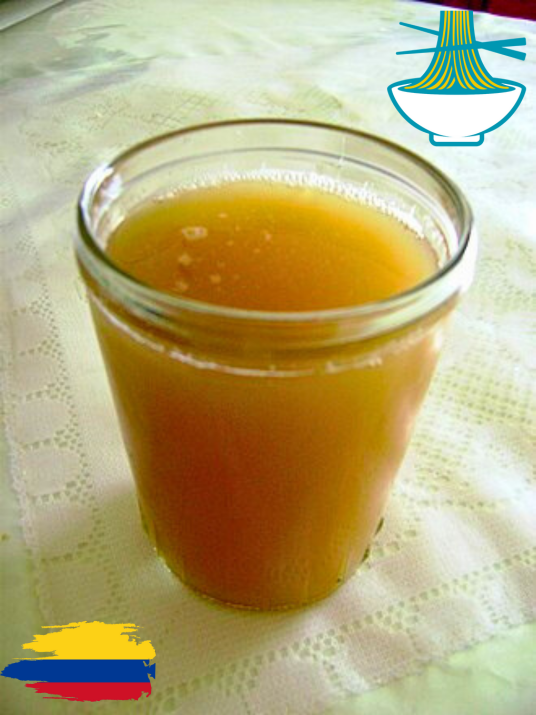The beverage Chicha has origins in Colombia and Panama, Chicha is a fermented (alcoholic) or non-fermented beverage from Latin America, originating in the Andes and Amazon regions. During the pre and post-Spanish colonial periods, maize beer (Chicha de Jora), made from a variety of maize types, was the most common type of Chicha. However, Chicha is also made from a variety of cultural and wild plants, including quinoa, kañiwa, peanuts, manioc (yuca or cassava), palm fruit, rice, potato, oca, and chañar. There are numerous regional variations of Chicha. In the Inca Empire, Chicha had ritual and religious uses.

Here is the detailed preparation method for Chicha:
Ingredients:
- Maize (any variety of corn can be used, such as yellow corn)
- Water
- Sugar
- Beer yeast
- Optional flavors like fruits or herbs
Preparation Method:
1. Soak the maize thoroughly and let it germinate for two days in a dark container covered with water.
2. After germination, peel the maize and grind it finely to extract the juice.
3. Mix the juice with water and sugar in a large container until the sugar is completely dissolved.
4. Add beer yeast to the juice and cover the container for fermentation, typically for 8-12 hours.
5. After fermentation, strain the juice and store it in tightly sealed bottles.
6. Add any additional flavors as desired, such as dried fruits or aromatic herbs.
Chicha is an integral part of the cultural and social identity in the region, used in religious rituals, youth initiation ceremonies, and social bonding. Consuming Chicha is part of building collective identity and strengthening social and cultural bonds. The use of Chicha reflects how people perceive their cultural identity and express their ideas about gender, ethnicity, nationality, and society.
Nutrition Value:
Maize (any variety of corn can be used, such as yellow corn):
- Calories: Approximately 100 calories per 1/2 cup serving
- Carbohydrates: About 20 grams
- Protein: Around 2 grams
- Fat: Less than 1 gram
- Sodium: Very low, usually less than 1 milligram
- Cholesterol: 0 milligrams
- Vitamins: Contains vitamin C, vitamin A, and several B vitamins
- Minerals: Provides potassium, magnesium, phosphorus, and trace minerals
benefits: Good source of dietary fiber, antioxidants, and energy
Water:
- Calories: 0 calories
- Carbohydrates: 0 grams
- Protein: 0 grams
- Fat: 0 grams
- Sodium: 0 milligrams
- Cholesterol: 0 milligrams
- Vitamins: No significant vitamin content
- Minerals: No significant mineral content
benefits: Essential for hydration and various bodily functions
Sugar:
- Calories: Approximately 16 calories per teaspoon (4 grams)
- Carbohydrates: About 4 grams per teaspoon
- Protein: 0 grams
- Fat: 0 grams
- Sodium: 0 milligrams
- Cholesterol: 0 milligrams
- Vitamins: No significant vitamin content
- Minerals: No significant mineral content
benefits: Provides quick energy but should be consumed in moderation
Beer yeast:
- Calories: Approximately 30 calories per tablespoon (12 grams)
- Carbohydrates: About 3 grams per tablespoon
- Protein: Around 4 grams
- Fat: 0 grams
- Sodium: 0 milligrams
- Cholesterol: 0 milligrams
- Vitamins: Rich in B vitamins, especially B12 and B6
- Minerals: Contains selenium, zinc, and other trace minerals
benefits: Supports gut health, boosts immunity, and aids in digestion
Optional flavors like fruits or herbs:
- Calories: Varies based on the specific fruit or herb used
- Carbohydrates: Varies
- Protein: Varies
- Fat: Varies
- Sodium: Varies
- Cholesterol: Varies
- Vitamins: Depends on the fruit or herb, can provide various vitamins like vitamin C, vitamin K, etc.
- Minerals: Depends on the fruit or herb, can provide minerals like potassium, calcium, etc.
benefits: Adds flavor, aroma, and potential health benefits depending on the chosen fruit or herb.


Comments